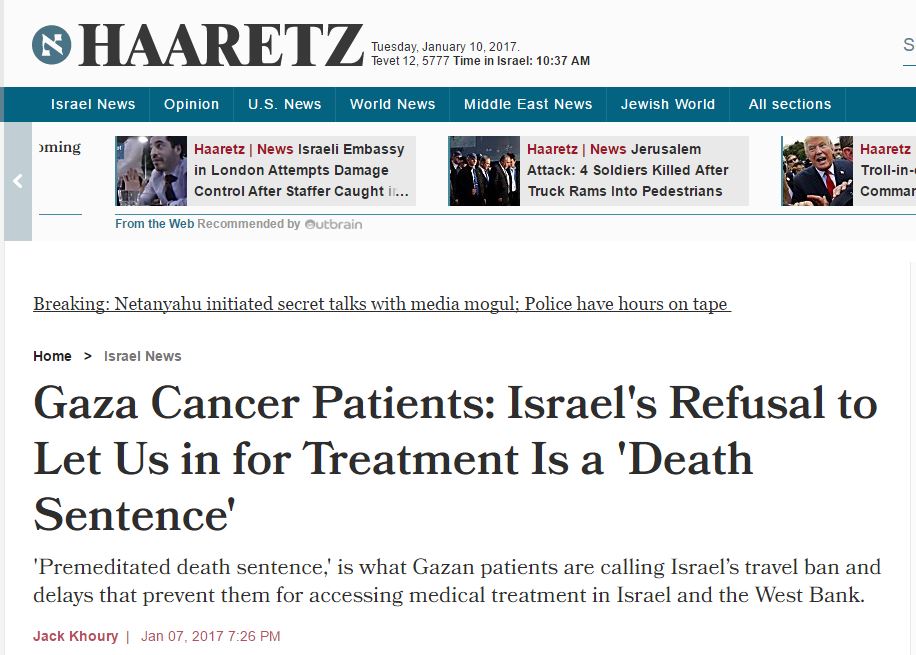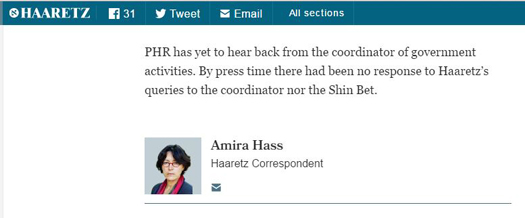Twice in the last six months, articles in Haaretz‘s English edition about increasingly rigid restrictions for Gaza cancer patients seeking to cross into Israel for treatment in Israeli or West Bank hospitals omitted the Israeli response: that Hamas is exploiting very ill cancer patients to smuggle money and information to terrorist operatives.
In both instances, back in July and also the week, the Hebrew version of the same article included this key information about Hamas coercion of cancer patients. The omission of the Shin Bet’s information concerning Hamas’ exploitation of cancer patients insthe latest instance of the well-document phenomenon of “
Haaretz, Lost in Translation,” in which
Haaretz‘s English edition downplays, whitewashes, or completely omits Palestinian violence or other wrongdoing.
In both cases, after CAMERA’s Israel office contacted editors of Haaretz‘s English edition, they commendably added the essential information about Hamas taking advantage of cancer patients. But the question remains: how did this omission of the very same point happen not once, but twice?
Most recently, early this week
Haaretz published in print and
online an article by Jack Khoury (“Gaza Cancer Patients: Israel’s Refusal to Let Us in for Treatment Is a ‘Death Sentence'”) about Gaza female cancer patients who launched a protest against tightened Israeli restriction. “The women say the protest follows a sharp rise in patients – especially cancer patients – who cannot leave Gaza for medical treatment in Israel, East Jerusalem or the West Bank after years of being allowed to do so,” the article states.

The article also includes allegations about specific patients. For instance, about protest leader Iman Shanan, who suffers from breast cancer, the article states: “She asked to go to the hospital for the examination three times, but every time her request was denied.” About another patient, the article states:
Majar Naizi, 27, also a former breast cancer patient, was referred to Assuta for tests to locate cancerous cells. She had been treated in East Jerusalem in 2014 and 2015, but her request to leave for an examination scheduled this past November 1 was denied.
Likewise, regarding a third patient, Sihan al-Tatri, the article alleges:
Tatri entered Israel twice and received the treatments, but when she wanted to have the third round of treatments she was denied entry. Her request is “being examined” and she has already missed two appointments for treatment.
The English article originally provided no response, explanation or information from Israeli authorities. In contrast, the Hebrew edition does commendably include the necessary response from the Israeli authorities. Moreover, it reports key information refuting the specific claims of patients Iman Shanan, Majar Naizi and Sihan al-Tatri.
Following communication from CAMERA, editors quickly added the following information which had appeared only in Hebrew and was originally omitted from the English edition:
In response, the Shin Bet said that it “allows residents of the Gaza Strip to enter Israel for medical treatment in accordance with the policies determining the movement of people between the State of Israel and the Gaza Strip and in the absence of any security impediment. Of late, we have witnessed repeated attempted by terrorist organization in the Gaza Strip, which take advantage of Israel’s willingness to grant entry to some patients for humanitarian reasons, to carry out terror attacks in Israel.”
According to the statement, “in this context, it is worth remembering that there have been a number of recent cases in which terror organization cynically took advantage of patients seeking medical treatment outside of Gaza, were given entry permits to Israel and in whose possessions we found utensils and money designed for use in terror attacks. Therefore, the requests that we receive from Gaza for entry permits into Israel are thoroughly vetted before any such permit is issued.’
The Shin Bet statement also related to the women mentioned in the above article. “Iman Shanan asked for permission to enter Israel to attend a conference in support of cancer patients. She did not submit a request to enter Israel for medical treatment. We have no record of any request from Majar Naizi. Sihan al-Tatri submitted her request to enter Israel for medical treatment in November and her request was granted.”
In July, Haaretz‘s Amira Hass wrote a similar article about cancer patients facing delays at the border crossing (“Ambulance Interrogations Delay Seriously Ill Patients Crossing into Israel from Gaza“). While the English article originally did not contain any response from the Israeli authorities, stating that “By press time there had been no response to Haaretz’s queries to the coordinator nor the Shin Bet,” the Hebrew version of the same article published the same day did claim a detailed, lengthy response from the Shin Bet.

After CAMERA appealed to editors to include the Shin Bet’s response which had appeared in the English edition, they added the following:
The Shin Bet responded that Hamas “time after time attempts to pass funds and/or instructions to terrorist elements in the West Bank via Gaza residents entering Israel… and even seriously ill patients.”
According to the Shin Bet, senior medical officials in Gaza were involved in issuing falsified medical certifications for money and other motives. “In some cases, the passage of imposters to Israel was done in an ambulance… and therefore the Israeli defense establishment needs to be suspicious,” it said.
PHR responded to the Shin Bet by saying that “our experience shows that in over half of the cases, patients who in the past had been denied exit for security reasons received permission following our intervention. This pattern suggests that Israel makes completely arbitrary use of these claims.”
In this case, Haaretz did not append a note to the bottom of the article notifying readers of the belatedly added information and did not run the added information in the print edition.


